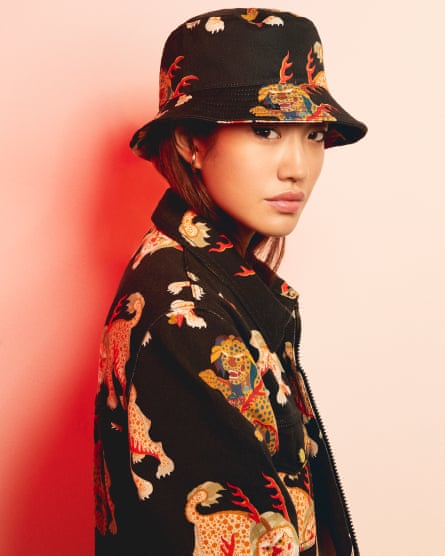Between the concrete walls of Funkhaus in Berlin, on a muggy July night, a whistling, whooping crowd are clapping sweaty palms together and chanting: “Peg-gy! Peg-gy! Peg-gy!”
Peggy Gou, the 28-year-old South Korean DJ and producer, is bringing her set to a storming close. Wearing a silky Louis Vuitton shirt and blue sunglasses, she has woven in acid house, drum’n’bass and grime, but nothing gets a response like the tantalising kickdrum of her own recent single, Starry Night. The other DJs, Palms Trax and Benji B, hold their own, but the unadulterated love is reserved for Gou. When she’s not behind the decks, she can be found in the crowd, posing for an endless queue of selfies.
It is special to catch Gou in Berlin, because while she ostensibly lives here, she is usually DJing around the world, being gifted toy giraffes (her favourite animal) or T-shirts printed with puns on her name (“Just Gou it”). Recently, she tells me over coffee, she managed to squeeze in a holiday in Ibiza – a “holiday”, in DJ terms, meaning that she managed to avoid travelling for a whole weekend.
Since arriving in Berlin, she has quickly risen to become one of dance music’s biggest names. “Before I was a DJ, I was a raver,” she says proudly. She would spend every weekend in Berghain, where the music she heard shaped the unpredictable DJ she is today. “I really like Detroit DJs, like Maurice Fulton. You feel like he’s going to play something techno, then all of a sudden it’s disco.”
Since materialising with her first release in 2016, Gou now has her own record label, a fashion label in association with Louis Vuitton’s Virgil Abloh, nearly a million Instagram followers and her very own mini-festival in London: this month’s Pleasure Gardens. She has never had a manager, evidently preferring to be in charge. When I turn up to meet her at a nail bar where she is getting a manicure, Gou takes over from her manicurist and quickly finishes the job herself. The resulting neon tips are immaculate.
Growing up, Gou was a huge K-pop fan (“old K-pop is better than new K-pop”), but her musical education really began when she moved to the UK at 14 for school. As a minor, Gou spent three years living with guardians, but “I became a rebel. I lied to them, and I’d come home late [from parties].” At 18, she got into the London College of Fashion, and spent every weekend dancing at Plastic People or Corsica Studios. When a promoter from the Soho club Cirque Le Soir noticed a Facebook photo of her behind decks – Gou had picked up the basics of beatmatching from a friend in Korea – they asked if she would like to play. She began a weekly residency at the Book Club in east London, and used her free time to teach herself how to produce using the audio software Ableton. Unsurprisingly, she failed her fashion course.
“My parents didn’t let me come back to Korea, because I failed, and they were like: ‘Do you know how much your course is? If you don’t pass, you’re not coming back’.” They made her stay at school for an extra two months to get the qualification. She moved to Berlin straight afterwards.

“This was my life in Berlin: working at a record store, working on music at home, Berghain every Sunday,” she summarises. “My parents were like: ‘You wanted to do fashion, now you want to do music, what’s next?’ I said to them: ‘Give me a few years. If I can’t, I will come back to Korea.’” Berlin’s cliquey club scene could be alienating. “I was always the outsider,” she remembers of her time in the record store. “The owner of that place ... When I’d talk about Berghain, he’d be like: ‘Why are you talking about Berghain?’”
Hostility from vinyl-heads was not enough to hold Gou back: in 2016, she began releasing a slew of EPs of lithe and lethal house. In 2018, she scaled new heights with the Once EP, containing It Makes You Forget (Itgehane), the tune that launched a thousand videos of English-speaking crowds awkwardly and enthusiastically singing in Korean.
Gou sometimes refers to her music as “K-house”. “I believe that a lot of Korean and K-pop artists, they want to be European,” she says. “But there are so many beautiful things in Korea. And that’s also one thing that I always get touched by: both of my big ‘hits’ are not in English. When I see that crowd reaction, it’s like, they don’t even know how to sing these lyrics, and they still love it. But I remember, every time I found a record where I couldn’t understand the lyrics, like a Japanese record, it becomes somehow precious. I know that feeling.”
Gou is free to make artistic choices as she pleases now, having established her own label, Gudu Records. “I’m not going to talk about certain negative things,” she says in a conspiratorial tone. “But with another label, I didn’t have much freedom: they decided everything. So I was like: I want to release my own music. I wanted to have freedom of genre, and I wanted to have control over when I release, artwork, everything.” She is focused on signing others, particularly Asian and female artists. “It is very important. I wouldn’t say it’s my goal just to go female, because for me music is music, it doesn’t matter about gender. Unfortunately, ratio-wise, we are still smaller than male DJs.”
She adds: “I had to fight a lot for what I want.” Referring to the cinematic video for Starry Night – directed by her partner, Jonas Lindstroem – she jokes that she is thinking of adding a tattoo of the video’s young taekwondo fighter to the many inkings on her arms. Aside from battles behind the scenes, Gou often finds herself a lightning rod for public criticism that sometimes belies the racism and misogyny that still persists in dance music.
She sparked controversy after appearing in an ad campaign for Nike – despite the fact that there is scarcely a DJ or producer who hasn’t accepted a brand cheque in 2019 – and her links to the fashion world are often used to undermine her credibility. When reading a recent three-star review of her DJ-Kicks mix on Resident Advisor, Gou felt stung: “They can talk about my mixing, they can talk about my music, I just found it funny that they were talking about ‘Instagram and luxury car campaigns’.”
But Gou is learning to rise above it. “Of course I do read comments, I do care, but I have a thicker skin than before,” she says. “I’m going to keep on doing what I want to do: life is too short. I choose who I take the advice and criticism from.”
As her relentless jetsetting summer draws to a close with Pleasure Gardens, Gou is preparing to retreat a little, and begin work on her debut album in September. She quotes one of her heroes, the French DJ Laurent Garnier: “Don’t worry if you disappear for three months. People will still remember you.” But her impatient, focussed determination makes it seem doubtful anyone will forget her. “I’m a very ambitious person, and I have so many things I want to do. I haven’t done even half of it yet.”
Peggy Gou Presents the Pleasure Gardens is at Finsbury Park, London, on 18 August

Comments (…)
Sign in or create your Guardian account to join the discussion